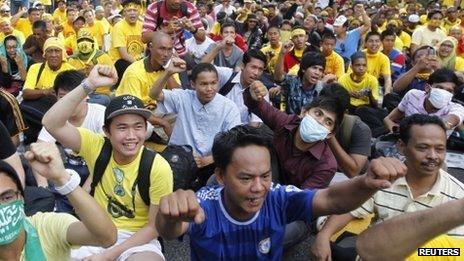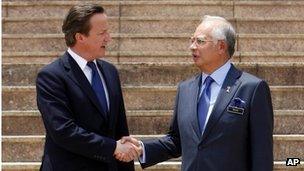Could street protests herald a Malaysian spring?
- Published

Demonstrators at a Bersih rally on 28 April before it turned violent
Malaysia's prime minister is visiting London as questions continue to be asked about his reformist credentials back home.
In early April Najib Razak was praised for his leadership by David Cameron when the British prime minister brought a trade mission to Kuala Lumpur.
Now Mr Najib is poised to call a snap election, despite more than 100,000 people taking to the streets to call for substantial changes to the voting system.
That demonstration, the largest Malaysia has ever seen, turned violent as the authorities tried to enforce a hastily arranged court ban stopping people entering Merdeka Square, the birthplace of independent Malaysia.
Scores of protesters were beaten by the police, and teargas and watercannon were fired at the crowd. Some said they had been attacked simply for wearing a particular t-shirt.
'Clean up'
The group behind the 28 April rally is called Bersih, which translates simply as "clean". It is a coalition of 84 non-governmental organisations united by the belief that Malaysia's voting system is rotten to the core.
"The system has been set up so the ruling party has to win a very low level of popular support to win a simple majority in government," Anbiga Sreenevasan, the Bersih co-chair and a litigation lawyer tells me from the calm of her practice's library.
Bersih have listed <link> <caption>eight key areas</caption> <altText>Bersih website</altText> <url href="http://bersih.org/?page_id=4111" platform="highweb"/> </link> which need addressing before an election is held.
They include cleaning up the electoral roll, reforming the postal ballot system, and a longer election campaign, which in 2008 ran for just eight days.
The ruling Barisan Nasional coalition, which has in various guises governed since independence, say the protests have become political and have been hijacked by opposition parties.
"Electoral reforms are ongoing," says Khairy Jamaluddin, a spokesman for the coalition.
"There's been a lot of concern about voters voting twice, of phantom voters and one of the most significant reforms is the introduction of indelible ink in the upcoming election."
He said opposition parties would be given fair access to the media during the campaign and that efforts were ongoing to clean up the electoral roll.
But 54 years of being ruled by the same parties has entrenched political bias into the judiciary, business and media. The internet is now where most independent-minded Malaysians go for their news.

David Cameron shakes hands with Najib Razak in Kuala Lumpur
One of the most popular sites is called <link> <caption>Malaysiakini </caption> <url href="http://www.malaysiakini.com" platform="highweb"/> </link> and its editor, Stephen Gan, pulls out a bar chart to demonstrate what he sees as the biggest flaw in Malaysia's voting system.
The graph shows that the usually rural constituencies won by the ruling BN coalition are overwhelming the least populated ones (some with just over 15,000 voters), with the opposition parties strongest in the larger urban districts (many over 80,000).
"The electoral system has been changed over the years and structured in such a way that the Barisan Nasional can win a majority with just 15-20% of the votes," Mr Gan says.
Most other countries operating first-past-the-post systems have limits on the variation in constituency sizes so that each person's vote has roughly the same clout. In Malaysia those limits were abolished in 1973, allowing huge disparities to occur.
Political bias
Responsibility for redrawing constituency boundaries fairly rests with the Electoral Commission. It is supposed to be independent but both Bersih and the opposition accuse it of being partisan towards the Barisan Nasional.
Bersih has also been accused of political bias, with the government accusing them of being hijacked by the Malaysian opposition.
In particular they point to controversial veteran Anwar Ibrahim.
Acquitted on sodomy charges earlier this year and blamed by some for instigating the Bersih violence, Mr Anwar says he sees the protests as part of what he is calling a "Malaysian Spring".
"Our preference is to go through a constitutional legal process," the 64-year-old said. "We've made our position very clear to Prime Minister Najib that he cannot assume that people will have the patience to go through the election process if they are convinced that process is fraudulent."
Despite all the opposition complaints, their showing in Malaysia's last general election in 2008 still shook the political establishment to its core.
From a high of more than 90% in 2004 the Barisan Nasional parliamentary majority dropped below two thirds for the first time (with 51% of the vote). Such was the fall-out that Prime Minister Abdullah Badawi resigned in favour of his deputy Najib Razak.
The son of Malaysia's second prime minister, Mr Najib immediately promised reforms and repealed a security law that allowed people to be detained indefinitely without trial.
Though a vote does not have to be called until next year, the widely-predicted early election would test not just Mr Najib's popularity but also how deeply Bersih's message has resonated beyond the streets of Kuala Lumpur